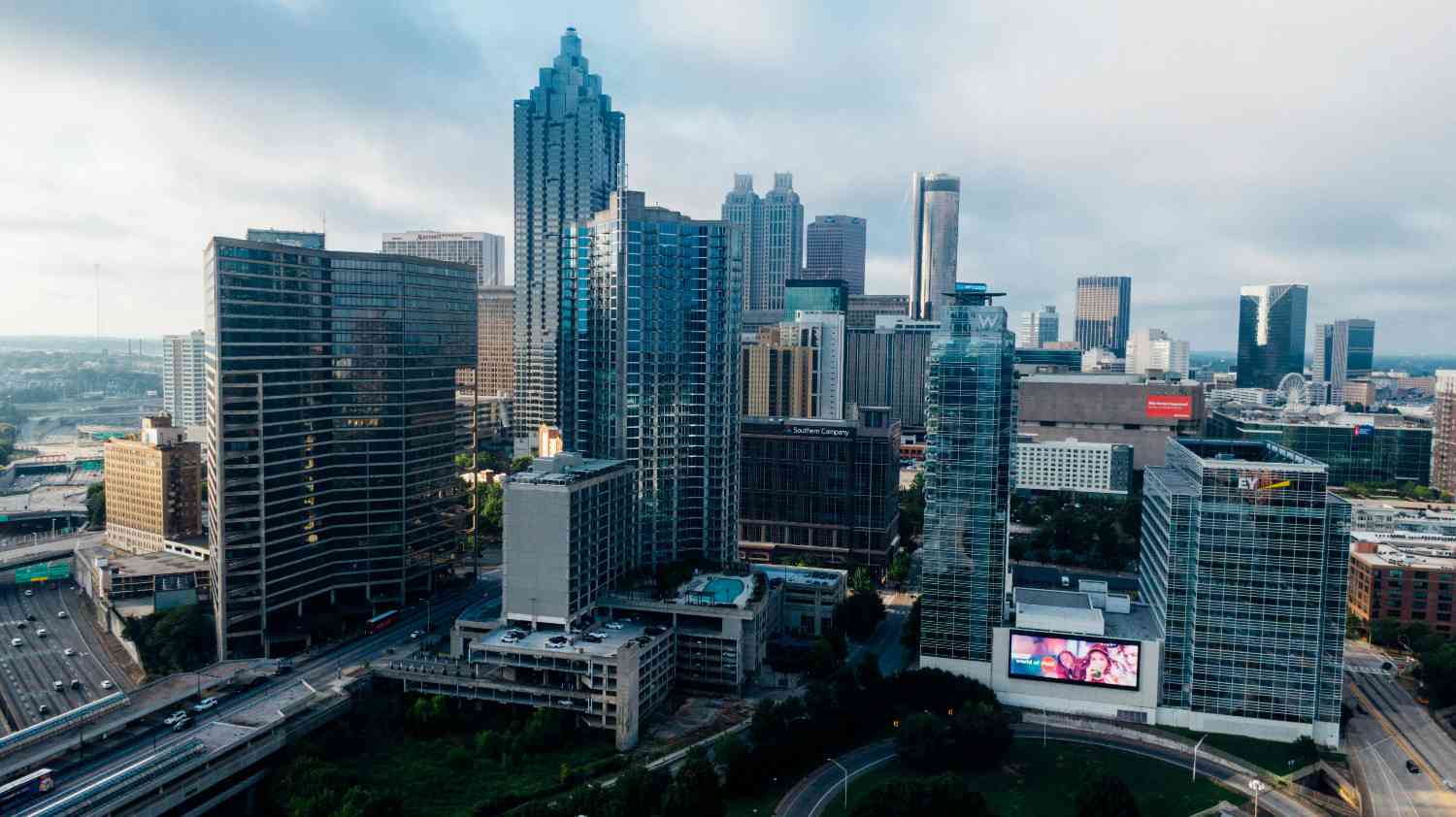The Atlanta housing market remains one of the hottest real estate destinations for homebuyers and investors alike. Known for its strong job market, growing population, and affordability relative to other major metros, Atlanta continues to offer lucrative opportunities — especially if you’re equipped with the right financing solutions.
Whether you’re looking to purchase a primary residence or build wealth through investment properties, Defy Mortgage’s specialized Non-QM and DSCR loans are designed to help you capitalize on the Atlanta real estate boom.
But first, let’s talk about what’s going on in the Atlanta housing market.
Current State of the Atlanta Housing Market
Atlanta’s real estate market has shown remarkable resilience through economic fluctuations, with 2025 showing strong indicators for continued growth. The metro area’s expansion is fueled by several key factors:
The Atlanta Housing Market Numbers You Need to Know
To understand the investment potential in Atlanta, consider these key market statistics:
- Average Home Price: As of February 2025, the average home price in Atlanta was approximately $421,346, reflecting steady growth year-over-year.
- Average Rental Rates: Atlanta remains attractive for rental investors, with average monthly rent around $1,587 as of early 2025.
- Occupancy/Vacancy Rates: Occupancy remains consistently strong, with a rental vacancy rate around 6.9%, indicating high demand for rental units.
- Appreciation Rate: Atlanta properties rank 7th in the nation by home appreciation over the last five years, experiencing a more than 100% cumulative increase.
- Days on Market: Median days on market in Atlanta are currently about 49 days.
- Price-to-Rent Ratio: According to Sofi, the price to rent ratio in Atlanta is currently at 21, suggesting a balanced market that can be favorable for both homebuyers and investors depending on neighborhood and property type.
These factors illustrate a healthy market with considerable room for investment upside.
Market Trends Shaping Atlanta Real Estate in 2025
Population Growth Driving Demand
Atlanta continues to experience significant population growth, welcoming approximately 89,000 new residents to the metro area in the past year. This influx is primarily driven by:
- Corporate Relocations: Microsoft has been in Atlanta since 2007, and they’re investing $1.8 billion in a data center campus near Union City, southwest of Atlanta, which will span 2.1 million square feet. Other major companies including Airbnb and Visa have expanded their presence in Atlanta, bringing thousands of high-paying jobs.
- Millennial Migration: The region ranks 5th nationally for in-migration behind Dallas, Phoenix, Tampa and Orlando.
- Remote Work Flexibility: With more companies adopting hybrid work models, Atlanta’s combination of affordability and quality of life attracts remote workers from across the country.

Infrastructure Development Enhancing Property Values
The ongoing expansion of Atlanta’s infrastructure is creating new investment hotspots:
- BeltLine Expansion: Properties within a half-mile of the BeltLine’s newest segments have seen values increase by $50,000 on average since construction began.
- MARTA Extensions: The planned expansion of public transit routes is creating new commuter-friendly zones with rising property values.
- Mixed-Use Developments: Projects like Ponce City Market and The Works are transforming formerly industrial areas into thriving residential and commercial hubs.
Best Neighborhoods in Atlanta for Real Estate Investment (2025)
If you’re planning to purchase real estate in Atlanta, here are the prime neighborhoods to target. Also, when evaluating the rent prices, keep in mind that these are (unless otherwise specified) based on the average rent for a mid-sized apartment – which many would consider to be the bare minimum rent for a full-sized single family. Since some of these are in high-density areas, condos are a great option for investors too (especially if they want something more hands-off).
1. Midtown
Why Invest?
Midtown is a lively urban hub that consistently draws young professionals and renters. It offers a mix of cultural attractions, entertainment venues, and dining options (e.g. the High Museum, Fox Theatre, Piedmont Park), all within a walkable area. Ongoing development projects (office towers, mixed-use complexes, the Midtown Union, etc.) keep housing demand steady and high.
2. East Atlanta Village
Why Invest?
East Atlanta Village is a vibrant, artsy neighborhood known for its eclectic bars, live music venues, street art, and locally owned shops. This “urban cool” vibe, combined with relatively affordable home prices, makes EAV highly attractive to young professionals, creatives, and budget-conscious tenants. The area enjoys continuous rental demand, as many renters seek out its blend of affordability and charm. From an investment standpoint, EAV has been undergoing steady revitalization – many older homes have been renovated, and new construction is popping up.
3. West End
Why Invest?
West End is a historic neighborhood offering excellent value and upside potential for investors. Current home prices are low relative to other intown areas, but the neighborhood is on the upswing. A major catalyst is the Atlanta BeltLine Westside Trail, which runs through West End and has spurred new parks, breweries, and development. Notably, the City of Atlanta and partners recently acquired the aging West End Mall site to transform it into a $450 million mixed-use community with housing and retail – a redevelopment expected to rejuvenate the area and drive property values higher.
4. Buckhead
Why Invest?
Buckhead – often dubbed the “Beverly Hills of the South” – is Atlanta’s most affluent district, known for luxury shopping (Lenox Square, Phipps Plaza), fine dining, and upscale estates. It offers a unique mix of tree-lined suburban tranquility and urban amenities. For investors, Buckhead promises high-end rental income and long-term stability. The area attracts affluent renters (executives, relocating professionals) willing to pay premium rents for single-family homes in prestigious neighborhoods.
5. Grant Park
Why Invest?
Grant Park blends historic charm with modern growth, making it a favorite for families and investors alike. This neighborhood is anchored by one of Atlanta’s largest green spaces (Grant Park itself) and the famous Zoo Atlanta, which draw visitors and enhance the area’s livability. The housing stock – beautiful 1920s Victorians, bungalows, and new craftsman infills – has seen continuous revitalization, driving property values upward.
6. Old Fourth Ward
Why Invest?
Old Fourth Ward has transformed from an overlooked area to one of Atlanta’s trendiest neighborhoods in just a decade. Fueled by the Atlanta BeltLine Eastside Trail and the redevelopment of Ponce City Market, O4W is now a hotspot for dining, nightlife, and arts. This vibrant cultural scene and the mix of historic homes and sleek new townhomes make O4W highly attractive to young professionals and creatives.
7. Reynoldstown
Why Invest?
Reynoldstown is a rapidly growing neighborhood benefiting directly from the Atlanta BeltLine’s Eastside Trail. Formerly a quiet historic district, Reynoldstown has in recent years seen a wave of new townhomes, modern infill houses, and apartment developments. Its prime location – walking distance to hotspots like Krog Street Market, the BeltLine, and even Ponce City Market – makes it very popular for those seeking convenience with a neighborhood feel.
Investment Strategies for Atlanta’s Diverse Market
Single-Family Rentals
The Atlanta market offers exceptional opportunities for single-family rental investors:
- Cash Flow Potential: In suburban areas like Stone Mountain and College Park, investors can find properties with all-in costs below $250,000 that generate monthly rents of $1,500+, creating positive cash flow even with conservative financing.
- Appreciation Play: Neighborhoods like Adair Park and Pittsburgh are in early gentrification stages, offering both reasonable cash flow and significant equity upside as revitalization continues.
Multi-Family Properties
Small multi-family properties (2-4 units) present compelling opportunities:
- Duplex/Triplex Market: Areas like East Point and Decatur offer multi-family properties at price points that still work for cash flow investors, with average prices ranging from $425,000 to $650,000.
- House Hacking Potential: First-time investors can leverage owner-occupied multi-family financing to secure better rates while living in one unit and renting the others.
Short-Term Rentals
Atlanta’s position as a business and tourism hub creates strong short-term rental demand:
- Corporate Housing: Extended-stay corporate rentals near major employment centers can generate 25-40% higher returns than traditional long-term rentals.
- Tourism Districts: Properties near attractions such as the Georgia Aquarium, Mercedes-Benz Stadium, and the Fox Theatre can achieve occupancy rates above 75% with proper management.
Financing Your Atlanta Real Estate Investment
Defy Mortgage specializes in providing tailored financing solutions for investors and homebuyers who don’t fit traditional lending boxes. With over 100 years of combined lending experience, Defy is your partner for Non-QM and DSCR loan solutions.

Our Loan Offerings:
- DSCR Loans: Perfect for investors focusing on rental properties, these loans qualify based on the property’s cash flow rather than personal income.
- Non-QM Bank Statement Loans: Ideal for self-employed borrowers and entrepreneurs who may not show traditional W-2 income.
- Foreign National Loans: Specialized programs for non-U.S. citizens looking to invest in Atlanta’s promising market.
- Interest-Only Options: Maximize initial cash flow with flexible payment structures.
- Fix-and-Flip Financing: Short-term loans designed specifically for rehab investors targeting Atlanta’s emerging neighborhoods.
Qualification Requirements:
- Credit score of at least 620
- DTI ratios up to 50% in most cases
- 10-30% down payments pending certain requirements
- Flexible documentation options (bank statements, rental cash flow, DSCR, etc.)
Economic Drivers Supporting Atlanta’s Real Estate Growth
Atlanta’s diverse economic base provides stability for real estate investors:
Major Employment Sectors
- Technology: Atlanta has emerged as the “Silicon Valley of the South” with companies like Microsoft, Google, and Mailchimp expanding their footprint.
- Healthcare: With Emory Healthcare, Piedmont Healthcare, and the CDC, medical employment provides thousands of high-paying jobs.
- Film and Entertainment: Georgia’s tax incentives have made Atlanta a major production hub, creating ongoing demand for housing near studios.
- Finance and Banking: Major financial institutions including NCR and Fiserv maintain significant operations in Atlanta.
Education Hubs
Properties near major universities often see stable appreciation and consistent rental demand:
- Georgia Tech: The surrounding areas continue to see strong growth driven by tech innovation.
- Emory University: The Druid Hills area benefits from proximity to this prestigious institution.
- Georgia State University: Downtown properties near campus remain in high demand for student and faculty housing.
Challenges and Considerations for Atlanta Investors
While Atlanta offers tremendous opportunities, investors should be aware of potential challenges:
Property Tax Reassessments
Fulton County has been aggressive with property tax reassessments in gentrifying areas. Investors should budget for potential increases when analyzing cash flow.
Neighborhood-Specific Regulations
Some neighborhoods have implemented short-term rental restrictions or zoning changes that could affect investment strategies. Working with a knowledgeable real estate attorney is advisable before purchasing.
Flood Zone Considerations
Parts of Atlanta are susceptible to flooding. Properties in Peachtree Creek’s watershed and other low-lying areas may require additional flood insurance, affecting overall returns.
FAQs: Atlanta Housing Market
1. What is the current average home price in Atlanta?
As of February 2025, the average home price in Atlanta is approximately $421,346, reflecting steady growth year-over-year.
2. What are the rental rates like in Atlanta?
The average monthly rent in Atlanta is around $1,587 as of early 2025, making it an attractive market for rental investors.
3. Which neighborhoods in Atlanta are best for real estate investment?
Some of the top neighborhoods to consider include Midtown, East Atlanta Village, Buckhead, West End, and Grant Park, each offering unique benefits such as strong rental demand, appreciation potential, and growth.
4. What types of properties are best for cash flow in Atlanta?
Single-family rentals in suburban areas, small multi-family properties (2-4 units), and short-term rentals in tourist areas can all provide strong cash flow potential for investors.
5. How do I finance my real estate investment in Atlanta?
Defy Mortgage offers specialized Non-QM and DSCR loans, including options for self-employed borrowers, foreign nationals, and those seeking interest-only or fix-and-flip financing. Qualification requires a minimum credit score of 620 and flexible documentation options.
6. What are the economic drivers supporting Atlanta’s real estate growth?
Key drivers include a thriving tech sector (with companies like Microsoft and Google), a robust healthcare industry, Georgia’s film and entertainment tax incentives, and major financial institutions based in the city.
7. Are there any challenges for investors in the Atlanta housing market?
Challenges include potential property tax reassessments in gentrifying areas, neighborhood-specific regulations like short-term rental restrictions, and flood zone considerations in certain parts of the city.
Ready to Invest in Atlanta?
Whether you’re looking to capitalize on Atlanta’s surging rental market or buy your dream home, Defy Mortgage has the ideal Non-QM and DSCR loan solutions to help you succeed.
Take the first step today: Contact Defy Mortgage to explore your financing options or get pre-approved now. If it’s easier, you can always give us a ring as well at 615-622-1032. If you have any questions, concerns, or situations you’d like to discuss, we’re here to help. Please don’t hesitate to reach out.

About the Author: Meet Todd Orlando, co-founder and CEO of Defy Mortgage and Defy TPO. With over 20 years of experience in banking and financial services at institutions like First Republic and Morgan Stanley, Todd has dedicated his career to broadening access to lending and revolutionizing the mortgage industry, particularly in the non-QM space.
In 2022, Todd launched Defy Mortgage to provide real estate investors, entrepreneurs, and self-employed individuals with a secure, streamlined, and personalized lending experience tailored to meet their specific needs. He knows firsthand how access to the right mortgage can make or break a project and how today’s borrowers need flexible financial partners and creative lending options designed for their unique needs and lifestyles. Traditional banks are rigid, and their one-size-fits-all approach is outdated. That’s why he created Defy Mortgage — to stay ahead of the curve, set new standards in lending, and deliver personalized, non-traditional solutions for those looking to purchase or refinance.
For the third year running, Todd has been recognized by Inman News for excellence in the mortgage and lending industry, landing on their prestigious Best of Finance list for 2025. He was also honored as a mortgage finance leader in 2023 and 2024 for the same award. His visionary leadership has earned him endorsements from esteemed former colleagues at prestigious institutions across the financial services spectrum.
Beyond his work in finance, Todd is also a co-founder of two software companies in commercial lending and healthcare tech, an active real estate investor, and a husband and father of three. An industry disruptor, Todd is here to redefine what’s possible in mortgage lending.
Mortgage broker itching to elevate client offerings? Check out our TPO business, Defy TPO: https://defytpo.com/




